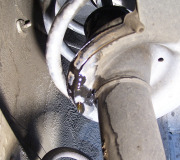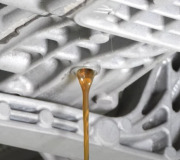Diesel fuel is considerably harder to ignite, especially in a relatively low-compression gas engine, so there won't be any engine damage from spark knock. Diesel fuel is somewhat of a lubricant while gasoline is a solvent. The diesel fuel will lubricate the injectors, which can't hurt them, but being a thicker viscosity, it will have a harder time spraying from them. Your fuel system runs at roughly 50 psi fuel pressure. To get diesel fuel to spray from their injectors, those fuel systems run at more than 2,000 psi. In your case that diesel fuel is diluted with gasoline. That will help it spray from the injectors.
It might help to understand that gasoline will not burn in liquid form. It has to turn into a vapor by the time it enters the engine, then it will burn. Years ago that was the job of the carburetor. Today it's the job of the injectors, but for then to do that, the gas has to be under pressure. Diesel fuel is not going to turn into a vapor by the time it enters the engine, so as far as power, expect to have less than normal until that diesel is used up.
If there is anything to worry about, it might be that diesel fuel is going to be ignited by the burning gas, and it may still be burning when it enters the catalytic converter. That excessive heat can lead to the catalyst melting and destroying it. It takes a little time for that heat to build up, so perhaps until this tank is used up, limit trips to as short as possible with some time in between for the exhaust system to cool down. That might be overly-cautious, but's worth it if it means not causing damage to the catalytic converter.
You might notice a little black smoke from the exhaust, and I wouldn't panic if some minor engine performance issues show up. If you can drive the vehicle comfortably, I would run the tank close to empty, then fill up with fresh gas. As long as you keep adding gas, you'll still have some diesel in the tank, so it's better to use up the entire tank first, then add the gas.
Also don't get excited if the Check Engine light turns on. We can address that later. The people at most auto parts stores will read the diagnostic fault codes for you for free, then, if you want to, you can go here:
https://www.2carpros.com/trouble_codes/obd2
to see the definitions, or I can interpret them for you. Once you write down the fault code numbers, they can be erased by the person who reads them for you, but have that done after you've filled with gas, otherwise those codes are likely to set again if there's still some diesel in the tank. Most commonly, expect to find codes in the area of P0300 to P0306 to be set. Those refer to engine misfires, which could be caused by some of the gas going into the engine being displaced by the diesel fuel that won't burn there. You may not even feel those misfires, but the Engine Computer can detect them.
Wednesday, January 15th, 2020 AT 1:18 PM


